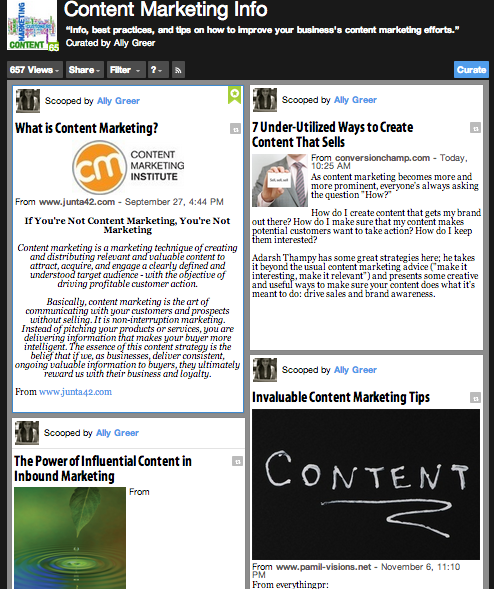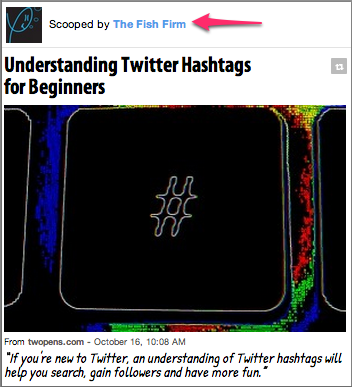My name is Ally Greer. I’m a marketer with expertise in content marketing and curation. You’ve probably never heard of me.
With over 500 million users on Twitter, 175 million on LinkedIn, and over a billion on Facebook, you probably haven’t heard of most people on the Internet. The bad news is that this also means most of those people probably haven’t heard of you either.
That said, I’m certainly not here to tell you how flooded the Internet is and discourage you from jumping into the information pool. In fact, I’m telling you to do the exact opposite. Although it isn’t likely that all 500 million people on Twitter will be following you by the time you’re finished reading this (or ever), there are a few ways to look what we call “information overload” right in the face and use it to your advantage.
In a digital world characterized by an overwhelming amount of noise, everyone is struggling to find relevant content from people and brands with an expertise on a specific subject. Content curators are the ones who step up to the plate.
According to Michael Brenner, cofounder of Business 2 Community, content curation is the process of identifying relevant content for your audience from multiple sources, modifying or editing that content to reflect the needs of your audience and delivering the content to the appropriate channels of distribution.
The truth is, you’re probably already curating content. Do you share links on Twitter? Do you Retweet content that you find interesting? Do you write blogposts referencing content that’s been created by others? If so, you’re a curator. You know what you’re talking about, you know where the best content on your topic of expertise is, and you put it together for the world to see. But, the question still looms: if no one knows who you are, how will they find it?
Enter a platform like Scoop.it. Scoop.it is a topic-centric curation publishing platform that allows you to create a digital magazine of the content that you’re sharing. This type of platform feeds you with content that’s relevant to your brand and your area of expertise, lets you hand select which content you’d like to share, provides you with the opportunity to add insight and context, and shares the content to all of your social networks.

The icing on the cake, though, is that all of your shared content is indexed in a visually pleasing magazine and in search engines. Sharing content on your social networks is great, but you’re only able to reach those readers within your social graph – that is, the ones who already know who you are and follow you. The benefit that topic-centric curation provides to you is that your name is now attached to all of the most relevant content on your topic of expertise, and you can be discovered by people within your interest graph – those who are looking for content on your shared topic of interest.
Picture this: A small business is curious about jumping into content marketing. I bet I could be a great help to them, but like most people in this world, they have no idea who I am. So, they turn to Google. Upon searching for “content marketing tips,” they click on a link to the article that I’ve shared on my Scoop.it page. To their delight, they’re brought to this online collection of numerous articles about content marketing where they can also find some context and added value thanks to what I’ve written in each post. To my delight, they can also see that this content was scooped by “Ally Greer.” Now, I’ve established myself as a reference for content marketing tips, and gained a whole new audience along the way.
Now, take my personal example and apply it to your brand. Perhaps you’re a social media consultant looking for new clients. You’re the best in the business and know everything there is to know about the importance of social media marketing and SEO. You’re using curation to share content and showcase your expertise. The only thing missing are the clients – the ones who don’t know you yet, of course. Now, when they search for information on social media marketing and SEO, they cant find all of the content that you found important and shared with the world and be led right back to you. Once they’re able to see that you have the expertise, they can click on you and be led straight to your profile and/or website. The rest, of course, is history!

This upcoming year is going to be the year of content. You’ve found it, you know about it; why not be discovered by it? Curation is in for 2013 – don’t be left out.
This post can also be seen on everythingpr.


Nice formation. so thanks
I spend hours writing an article, and not making any money from my blog. So I do not allow this curation from your website : duplicate content (since there is no limit for the description)… I do not allow content marketing with my blog in particular when some company will make an reputation with my work .
I do not make any money from my blog, so why your website or other company will ?
I do not create any cash from my weblog, so why your web page or other organization will ?
Nice formation. so thanks
I spend hours writing an article, and I am not making any money from my blog. So I do not allow this curation from your website : duplicate content (since there is no limit for the description)… I do not allow content marketing with my blog in particular when some company will make an reputation with my work .
I do not make any money from my blog, so why your website or other company will ?
I do not create any cash from my weblog, so why your web page or other organization will ?
Is it a good practice to share the content from scoop.it on our blog (http://towntawks.com/blog in my case)? Though I havent tried it but if I would ever do, I will do so by adding my insights for sure. But keeping in view Google’s strict policies, is there any danger of my curated content sourced from scoop.it penalized in some way or another? Guidance will be appreciated.